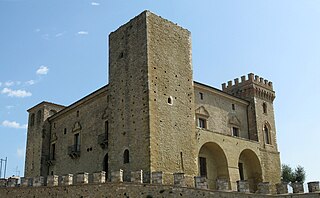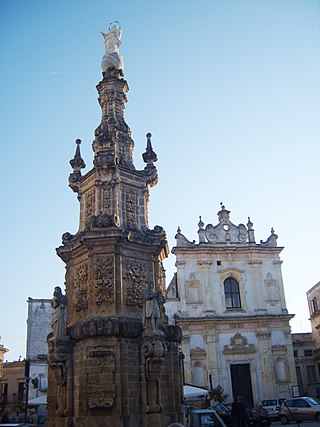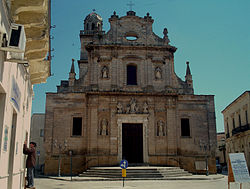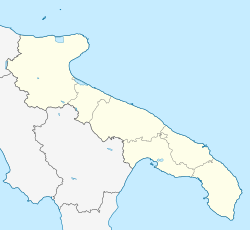
Lecce is a city in southern Italy and former capital of the province of Lecce, with the second-highest population in the Apulia region. It is on the Salentine Peninsula, at the heel of the Italian Peninsula, and is over two thousand years old.

Salento, is a cultural, historical, and geographic region at the southern end of the administrative region of Apulia, in southern Italy. It is a sub-peninsula of the Italian Peninsula, sometimes described as the "heel" of the Italian "boot". It encompasses the entire administrative area of the Province of Lecce, most of the Province of Brindisi, and the south-eastern part of the Province of Taranto.

Martano is a town and comune of 9,573 inhabitants in the province of Lecce in Apulia, Italy, 20 kilometres (12 mi) from Lecce and 18 kilometres (11 mi) from Otranto. It is the biggest town of Grecìa Salentina, an area where some inhabitants, in addition to Italian and Salentino can also speak a greek dialect called Griko.
Zollino is a small town and comune of 2,194 inhabitants in the province of Lecce in Apulia, Italy. It is one of the nine towns of Grecìa Salentina, which still keeps Greek language and traditions.

Crecchio is a comune and village in the province of Chieti, part of the Abruzzo region in central Italy. The village preserves its medieval aspect and is dominated by its castle. It is one of I Borghi più belli d'Italia. Its main activities are agriculture and tourism, yet small family-run businesses exist.

Negroamaro is a red wine grape variety native to southern Italy. It is grown almost exclusively in Apulia and particularly in Salento, the peninsula which can be visualised as the "heel" of Italy. The grape can produce wines very deep in color. Wines made from Negroamaro tend to be very rustic in character, combining perfume with an earthy bitterness. The grape produces some of the best red wines of Apulia, particularly when blended with the highly scented Malvasia Nera, as in the case of Salice Salentino.

Italian wine is produced in every region of Italy. Italy is the country with the widest variety of indigenous grapevine in the world, with an area of 702,000 hectares under vineyard cultivation, as well as the world's second largest wine producer and the largest exporter as of 2023. Contributing 49.8 million hl of wine in 2022, Italy accounted for over 19.3% of global production, ahead of France (17.7%) and Spain (13.8%); the following year, production decreased by 11.5 million hl, and Italy was surpassed by France. Italian wine is also popular domestically among Italians, who consume a yearly average of 46.8 litres per capita, ranking third in world wine consumption.

Grottaglie is a town and comune (municipality) in the province of Taranto, Apulia, in southern Italy.

Gallipoli is a southern Italian town and comune in the province of Lecce, in Apulia. In 2014, it had a population of 31,862 and is one of the towns where the Greek dialect Griko is spoken.

Acquaviva delle Fonti is a town and comune of 20,446 inhabitants, in the Metropolitan City of Bari, in Apulia, Italy. Acquaviva is famous for its characteristic red onions, which have been awarded the DOP mark. The main monuments are the Palazzo de Mari, the Co-Cathedral of Sant'Eustachio and the ancient village. The town is located on the Murge plateau at an elevation of 300 metres (980 ft) above sea level, and is 26 kilometres (16 mi) from the Adriatic Sea and Bari, which is the biggest city of the region. The Ionian Sea is more than 45 kilometres (28 mi) to the south.

Nardò is a town and comune in the southern Italian region of Apulia, in the Province of Lecce.

Copertino, also known in English as Cupertino, is a town and comune in the province of Lecce in the Apulia region of south-east Italy.

Cutrofiano is a town and comune in the province of Lecce in the Apulia region of south-east Italy. It is known for its shoes and ceramic production.

Guagnano is a town and comune in the province of Lecce, Apulia, south-eastern Italy. Situated in northern Salento, it also includes the fraction of Villa Baldassarri.

Leverano is a town and comune in the province of Lecce in the southeastern part of the Apulia region of south-east Italy. It is bounded by the comuni of Arnesano, Carmiano, Copertino, Nardò and Veglie.
Velhe is a town and comune in the Italian province of Lecce in the Apulia region of south-east Italy. Veglie is 20 kilometres (12 mi) west of Lecce and 12 kilometres (7 mi) east of the sea, the Gulf of Taranto. It is bounded by the comuni of Campi Salentina, Carmiano, Leverano, Nardò, Novoli and Salice Salentino.

Salentino is a dialect of the Extreme Southern Italian spoken in the Salento peninsula, which is the southern part of the region of Apulia at the southern "heel" of the Italian peninsula.
Salice Salentino is an Italian wine produced primarily from the Negroamaro grape in the area surrounding the municipality of Salice, in Apulia. The wine received DOC status in 1976. Chiefly known as a red wine, it also exists as a white and rosé.
Salice-Veglie is a railway station in Salice Salentino, Italy. The station is on the Martina Franca-Lecce railway. The train services and the railway infrastructure are operated by Ferrovie del Sud Est.



















